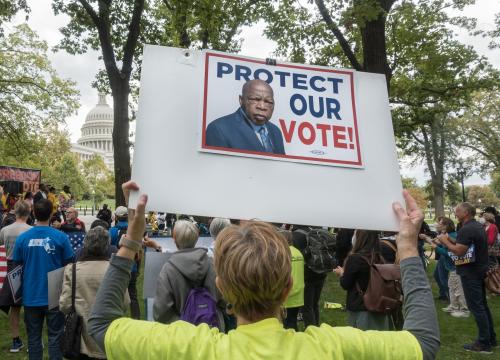We are less than one year away from Election Day and although there has been no new evidence or litigation regarding election fraud in the 2020 election, many people continue to believe that the 2020 election was flawed. In the summer, a poll by the Associated Press showed that 22% of Republicans and 71% of Democrats have high confidence in votes being counted accurately in 2024. A more recent Washington Post poll found that among New Hampshire Republicans, over 50% believe Biden’s win was fraudulent, including 85% of Trump supporters.
Chief among those who continue to believe that the 2020 election was fraudulent is the former president, Donald Trump, who can’t seem to stop talking about it. In one post, he goes after the Republican Party for not doing enough — “… the RNC, and Ronna McDaniel, must spend their time working on this, instead of meaningless Debates where I am up by more than 50 points.”
So, where’s the fraud?
The Heritage Foundation, a conservative think tank, has been monitoring election fraud cases state by state. Election fraud covers a range of activities — such as registering someone to vote and forging their signature, filling out an absentee ballot for someone who has died or moved away, voting while ineligible, or pretending to be someone else at the polling place and voting. They find that there have been 1,465 proven cases of election fraud — 1,264 of these resulted in criminal prosecutions and the remainder resulted in civil prosecutions, diversion programs, judicial findings, or official findings.
These may sound like big numbers, however, they must be examined in context. The findings encompass more than a decade of data during which, nationally, hundreds of millions of votes have been cast. For instance, in Texas, Heritage found 103 cases of confirmed election fraud. However, those 103 ranged from 2005 to 2022 during which time over 107 million ballots were cast. There were 11 million ballots cast in the 2020 presidential election alone. The fraud in Texas amounted to 0.000096% of all ballots cast — hardly evidence of a fundamentally corrupt system.
Of course, true conspiracy believers will argue that Trump opponents knew that Trump was going to win Texas, so they didn’t bother to commit fraud there — fraud was only rampant in the swing states. But the story is much the same in swing states. For instance, in Arizona, where President Biden won by a mere 10,457 votes in 2020, Heritage documents just four cases of fraudulent voting in the general election. Furthermore, while former Republican gubernatorial candidate and 2024 Senate candidate Kari Lake falsely claimed widespread fraud following her loss in 2022, there have been zero reported cases from that year thus far. To put these cases (or lack thereof) in perspective, Arizonans cast over 6 million votes in the 2020 and 2022 general elections. There is also minimal evidence to suggest that the few fraudulent votes benefited Democratic candidates. In one 2020 case, a 64-year-old Arizona Republican cast a Republican ballot on behalf of her deceased mother in an apparent effort to counteract what she believed was widespread voter fraud by Democrats.
Other swing states have also recorded negligible numbers of election fraud. In Georgia, Heritage has reported no cases of fraud in the 2020 or 2022 general elections, in which nearly nine million votes were cast. Otherwise, just one case of fraud has been reported in the state in the last four years. It involved a 62-year-old convicted felon who filled out and submitted a ballot sent to the wrong address during the January 2021 Senate runoff election. And yet Trump’s attempts to overturn the election results in Georgia are based on his assertion that there was enough voter fraud to flip the state.
In Florida, there were nine cases of election fraud between the 2020 and 2022 elections but many of those involved individuals who were confused over whether or not they had the right to vote.
In 2018, voters in the state passed a constitutional amendment allowing people convicted of felonies to vote once they had served their time. Subsequently the Florida legislature passed a law requiring felons to pay all fines before they could vote. In fact, some of those convicted of voter fraud were even given a Florida voter ID card and specifically told by local election officials that they would be able to vote. This was contested as a violation of the constitutional ban on poll taxes. The administrative back and forth left some would-be voters confused about their right to vote (or rather, lack thereof). Whether or not this is evidence of widespread fraud is questionable to say the least.
So, what’s going on here? Nothing. Confirmed conspiracy theorists never take no for an answer, so they will certainly insist that there was massive fraud or that prosecutors were bought off. But one fact about elections is often overlooked. The political parties at the national, state, and local level have an intense interest in who votes and how. That’s why, come election years, both parties mobilize thousands of attorneys who, armed with blank injunctions, are ready to run to court at the slightest sign of illegal behavior. In Pennsylvania alone, for example, it is estimated that litigation attempts cost $4 million in taxpayer dollars. Despite the millions of dollars spent on litigation attempts regarding the 2020 election, 61 out of the 62 lawsuits filed had failed by January 2021 alone.
To believe that massive fraud could occur against the Republican Party means that one also has to believe that the Republican Party was asleep at the switch — that they did not mobilize attorneys or that the attorneys they did mobilize didn’t do their job. In fact, Donald Trump is attacking his own hand-picked and loyal Republican National Committee Chair, Ronna McDaniel, for not spending more time preventing fraud. The same woman was party chair in 2020 — if she had really cost Republicans the election by failing to find evidence of fraud that would stand up in court, why did Trump keep her around?
Heritage admits that their tracker is not complete, and we have no doubts that there are probably cases out there still to be discovered or prosecuted. But thus far, the amount of proven election fraud is miniscule.
The Brookings Institution is committed to quality, independence, and impact.
We are supported by a diverse array of funders. In line with our values and policies, each Brookings publication represents the sole views of its author(s).









Commentary
Widespread election fraud claims by Republicans don’t match the evidence
November 22, 2023